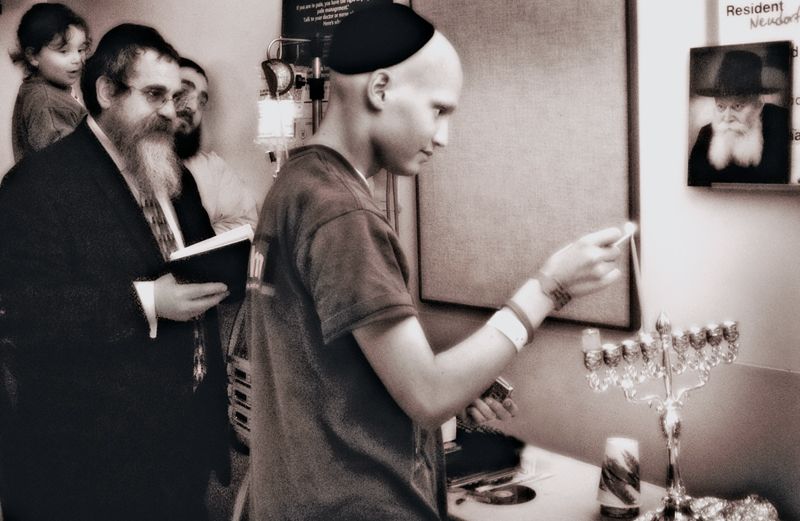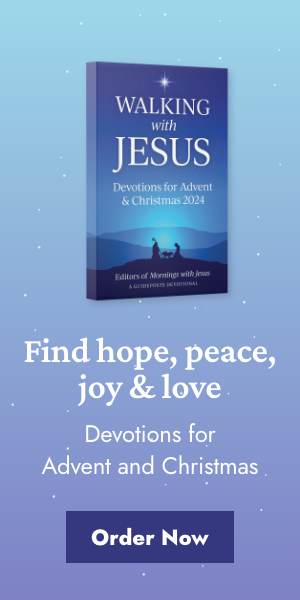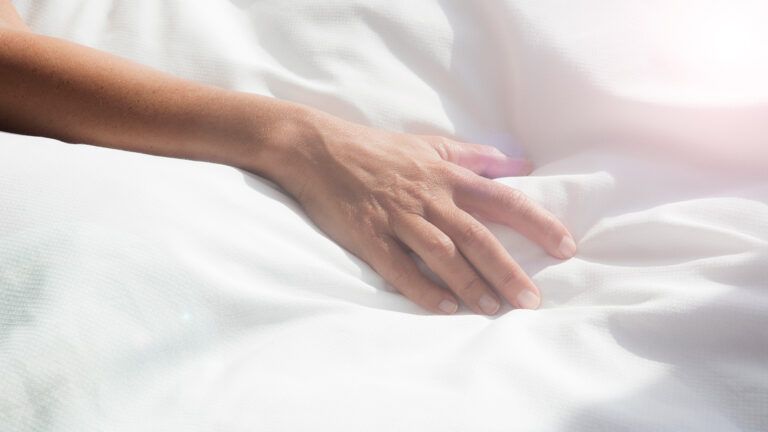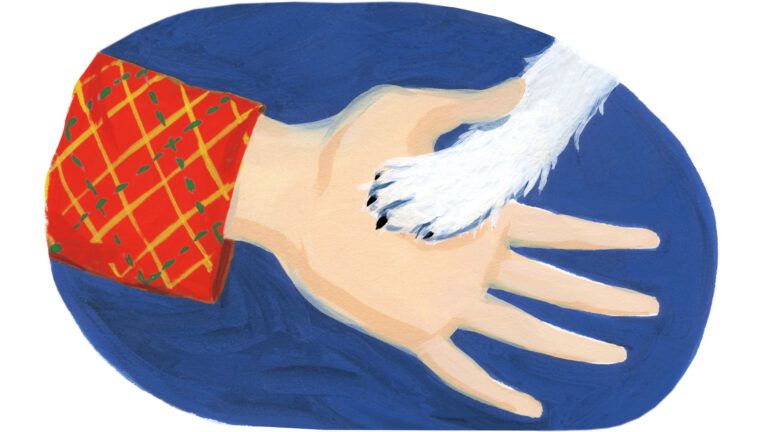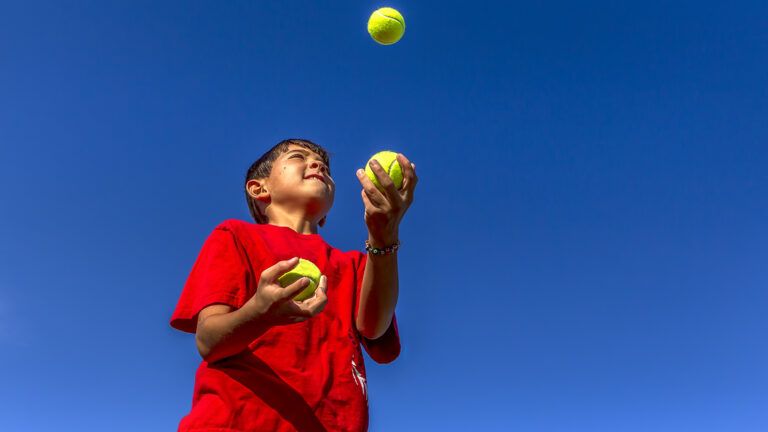I awoke thinking that I was at my parents’ house.
I could almost smell Mom’s potato pancakes in the air, hear the comforting sounds of her and my father, whom I call Aba, bustling about downstairs.
But then my eyes finally adjusted to the fluorescent light. The pale green walls, the metal bed rails…I remembered where I was: the UC-Irvine Medical Center cancer ward. The last place on earth I wanted to be, especially the first night of Hanukkah.
I lay in the hospital bed, woozy from antibiotics. The drugs left me in a kind of haze, never quite certain what was real and what was imagined. I remembered Mom bringing me here several days ago, feverish and miserable.
By now I had come to expect long hospital stays after chemotherapy treatments that left my immune system helpless against infection. But I had prayed—had believed—that this time would be different.
After months of fighting leukemia I wanted to be home for Hanukkah with my family, to light the menorah and hear the story of how when the temple was rededicated in Jerusalem there was only enough oil to light the menorah for one day.
But it continued burning until more oil could be made—for eight days!
I looked forward to my father, a rabbi, saying the traditional prayers, those words honoring a God of miracles. I needed to hear my father’s voice, to feel his unshakeable faith.
But that wouldn’t be happening. No way could a menorah be lit in a hospital room. A fire hazard, the hospital staff said.
I sank back into the pillow. God, I prayed, you knew how much I needed this. Couldn’t you have granted me this much?
I didn’t want to think about the alternative. Perhaps God was answering me. Maybe this was his way of telling me that the cancer had finally won.
This isn’t how my life was supposed to turn out, I thought. I was going to be a rabbi, walking in my father’s footsteps, one of God’s servants. I’d just finished my second year of rabbinical school that July when I came down with what I thought was a bad case of the flu.
Then I got the diagnosis: leukemia, an extremely aggressive form. Even with the most powerful chemotherapy available, my chances for survival were slim.
Slowly I sat up. I was still alive, if you could call it that. I’d survived longer than doctors expected, months longer. But what was the point if I couldn’t celebrate my faith? Why now, when I needed God most, did it feel as if he had abandoned me? Why hadn’t he just let me die in July?
“Have faith,” my father always counseled at times like this. “Remember God’s teachings.”
Aba had been the one who had assured me that I would celebrate Hanukkah. Even in the hospital. “We’ll get it done,” he had said with total conviction. I’d believed him, until I’d overheard the conversations outside my room.
“An open flame?” a voice had said. “In the hospital? You’ve got to be kidding.” I’d heard nothing more about it from Aba. I’d never known him to fail. It must have crushed him.
In just a few hours—a half hour after sunset—menorahs would be lit along the West Coast.
I thought of everything that would be happening at home, Mom making foods fried in oil like potato pancakes to remind us of the first Hanukkah. Aba arranging the menorahs around the dining room table, one for each family member. All of us lighting them after Aba said the prayers.
Except for me. Would Aba even put out my menorah? What would be the point?
The hospital was oddly silent, as if everyone had left me. I felt myself fading, getting weaker. My eyes closed.
I awoke to what seemed like a dream. There gathered in my room were my parents, my grandmother, my brother-in-law, my sister and her baby. Four generations. And someone I didn’t recognize, a man in a blue uniform.
“I’m from the hospital maintenance department,” he explained. “The fire department asked me to be here.”
My mother held out a new silver-plated, oil-burning menorah. “Happy Hanukkah,” she said, setting the menorah on a table by my bed. “You know your father. He can be very persuasive.”
“This is your Hanukkah, Yosef,” my father said with a smile. “They would permit only the one menorah. So we would like you to light it and then say the prayers.”
“But, Aba, you’re the rabbi,” I weakly protested.
“So I get to decide,” he responded.
Slowly I swung my legs onto the floor and stood, leaning on my father. The maintenance man stepped forward. My hand shook slightly as I lit the oil. The flame enveloped the wick and I could feel its warmth, first on my hand and then through my body.
Then I heard myself praying the words I’d longed to hear. “Blessed are you, Lord our God, King of the universe, who performed miracles for our forefathers in those days, at this time.”
“Beautiful,” my father said when the prayers were finished. “You didn’t need to hear me pray. You needed to say the words yourself.”
It was true. This was my twenty-first Hanukkah, but it was as if I were hearing those words for the very first time. God, creator of miracles, from the beginning, hemmed in by a few hospital rules?
I had been the one who had put limitations on what he could do. To him, even my leukemia wasn’t an obstacle.
That Hanukkah in the hospital was the first of many miracles that God performed in my life. Ultimately he connected me with an Israeli bone-marrow donor whose gift left me cancer-free. I finished school and was later ordained as a rabbi.
The first night of Hanukkah this year, I’ll sit down at my parents’ table, laden with Mom’s good cooking, and listen to my father say the prayers. Then I will light my silver menorah, the flame of my faith burning brighter and stronger than ever.
Download your FREE ebook, A Prayer for Every Need, by Dr. Norman Vincent Peale
